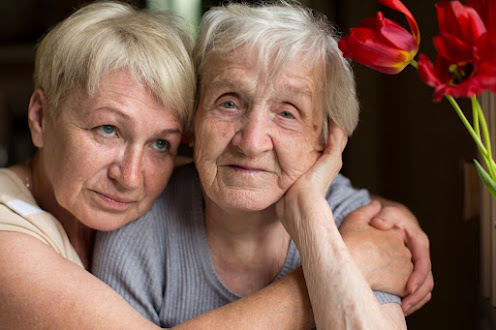Taking Care of Yourself as a Caregiver
Thursday, October 21, 2021

You might have heard the term “aging in place.” It refers to the elderly, dementia, and Alzheimer’s patients aging at home for as long as possible. There really is no place like home and most people want to stay surrounded by the comforts of home as long as their health allows them to do that.
Even patients with certain challenges can still age in place while depending on some outside help. But how do you make sure that you as a caregiver survive this task and get the rest you need as well? Read on!
Caregivers have come to replace a more medically assisted role during recent years.
So, just who is a caregiver and what do they do?
Caregivers have a unique role. They may be caring for a sick spouse, a disabled child, or even a convalescing or aging family member. It’s crucial to recognize your role so that you can receive the support that is available to you. While being a caregiver is very rewarding on many levels, sometimes the best reward is simply knowing the patent best, what makes them happy, and how to give them more pleasurable days.
Don’t be surprised though, if a change of emotions comes—this is totally normal. Feelings of frustration or even anger can surface when caregiving and it’s important to know how to cope with these feelings.
Caregivers may find they are resentful of the lack of formal schooling in a certain trade, they may feel lonely or isolated, and can often feel exhausted, especially if the patient won’t let anyone else help them.
How Can Caregivers Take Better Care of Themselves?
The National Institute on Aging gives ways to cope with the stress incurred when caring for a loved one with dementia or Alzheimer’s. Here are a few of their suggestions:
Take help when offered. Create a list of things you would find helpful and allow the person who wants to help to choose something from that list. This may be something like going on a walk with the patient or helping prepare a meal.
Focus on what you can do. Feelings of guilt are normal but keep it in check. No one is perfect and there is no such thing as the perfect caregiver. Caregivers tend to be hard on themselves, so keep that in mind as you go through your day.
Find support. There are many options for support, both in social media and in groups you can be a part of. People in these groups understand the challenges of being a caregiver and can help with practical ideas. They may also have clever ideas when it comes to errands and transportation.
Stay healthy yourself. Drink lots of water, eat healthy food, and get plenty of exercises.
Get adequate sleep. Getting enough sleep is critical for good health. Stress, lack of sleep, and inadequate exercise are the three biggest reasons for poor health among caretakers. Take the measures needed to get the rest you need so you can help your loved one properly.
Final Thoughts….
One of the most difficult parts of being a caregiver is leaving that loved one with someone else for the day or even overnight when you need to getaway. However, it’s a necessary thing in order to stay sane and healthy. Loved ones who suffer from dementia or Alzheimer’s often act like children when they are left with someone else. Just keep in mind that they will be fine and that it’s important for you to have a break.
There are also daycare centers that specialize in caring for your loved ones with mental impairments and keeping to the schedule they are used to.
There are many resources out there that help with isolation and frustration that often comes to caregivers. Please take advantage of them!
For more information on how to better care for yourself as a caretaker, please contact us today!
Legal Disclaimer
This blog provides general information and discussions about medicine, health, and related subjects. The words and other content provided in this blog, and in any linked materials, are not intended and should not be construed as medical advice. If the reader or any other person has a medical concern, he or she should consult with an appropriately licensed physician or other healthcare workers.
Never disregard professional medical advice or delay in seeking it because of something you have read on this blog or in any linked materials. If you think you may have a medical emergency, call your doctor or 911 immediately.
The views expressed on this blog and website have no relation to those of any academic, hospital, practice, or other institution with which may have been mentioned or linked to in the article.
